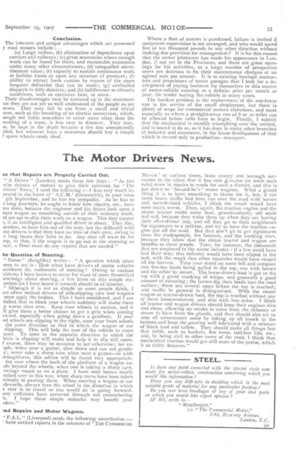The Motor Drivers News.
Page 27

If you've noticed an error in this article please click here to report it so we can fix it.
ee that Repairs are Properly Carried Out.
" A Driver " (London) sends these few lines :--" As you tvite drivers of motors to give their opinions for The rivers' News,' I send the following :—I was very much inrested in the letter of A.C.M.' (Greenwich), in your issue 5th September, and he has my sympathy. As he has to ) long journeys, he ought to know how repairs, etc., have en done, because the engineer and his fitters look upon a earn wagon as something outside of their ordinary work, Id are apt to skip their work on a wagon. This they cannot ), if an intelligent and qualified driver is about. They like, .erefore, to have him out of the way, but the difficulty with ost drivers is that they have no time of their own, owing to .e long hours they have to do. Any time off must be for so that, if the wagon is to go out in the morning as ;ual, a fitter must do any repairs that are needed."
he Question of Steering.
" Nemo " (Keighley) writes :—" A question which often mes to me is : How often have drivers of motor vehicles insidered the rudiments of steering? Owing to various cidents I have known to occur for want of more theoretical towledge about steering, a few hints on this simple meanisrn (as I have heard it termed) should be of interest. " Although it is not as simple as some people think, I we often noticed drivers of side-slipping cars and wagons once apply the brakes. This I have considered, and I am tisfied that to block your wheels suddenly will make them p worse than ever. Keep your wheels in motion, and it [II give them a better chance to get a grip when coming rwarcl, especially when going down a gradient. If your nd wheels are slipping to the right, steer your front wheels the same direction as that in which the wagon or car slipping. This will help the rear of the vehicle to come uare. To steer in the opposite direction to which the hick is slipping will make and help it to slip still more. I course, there may be occasion to act'otherwise ; for exlple, when near a gutter, slow down and run out graduy ; never take a sharp turn when near a gutter—in wide oroughfares, this advice will be found very appropriate. the case where the back of the platform of a wagon exids beyond the wheels, when one is taking a sharp turn, swings round as on a pivot. I have seen horses nearly Locked over in this way, when sharp turns have been taken relessly in passing them. When steering a wagon or car ckwards, always turn the wheel in the direction in which e rear is to travel as you would do in going forward. any collisions have occurred through not remembering is. I hope these simple remarks may benefit your iders."
)ad Repairs and Motor Wagons.
F.A.L.".(Liverpool) sends the following contribution :— have noticed reports in the columns of ' THE COMMERCIAL.
MOTOR at various times, from county and borough surveyors to the effect that it has cost ,.-;t0,0ock (or some such sum) more in repairs to roads for such a district, and this is put down to So-and-So's ' motor wagons. What a grand thing it is to have something to blame for it, but, if the same heavy traffic had been run over the road with horses and narrow-tired vehicles, I think the result would have been much worse. Then, again, the traction engine and the steam tractor make some dear, grandmotherly, old souls feel sad, because they wake them up when they are having their after-dinner nap, and off they go to their neighbours for signatures to a petition, and try to have the traction engine put off the road. But they don't go to get signatures from the tradespeople, the farmers, and the working man, because they know that the steam tractor and wagon are benefits to these people. Take, for instance, the thousands that are employed in the motor industry : if a few could have had their way, this industry would have been nipped in the bud, with the result that other countries would have reaped all the harvest. Take your stand on some hill and compare two five-ton loads being pulled to the top, one with horses and the other by steam. The horse-drawn load is got to the top with a great cracking of whips, and generally a good amount of swearing; the horses dig their hoofs into the road surface; there are several stops before the top is reached; and traffic in general is disorganised. With the steam wagon or tractor-drawn load, the top is reached without any of these inconveniences, and also with less noise. I think all tractor and wagon drivers should keep their engines nice and clean, allowing no smoke to come from the chimney or steam to blow from the glands, and they should also try to stop all unnecessary noise by taking up all knock in the brasses and keep the gearing well lubricated with a mixture of black lead and tallow. They should make all things fast that rattle, such as buckets, fire irons, tool-box lids, etc., and, by being civil to other users of the road, I think that mechanical traction would get still more of the praise, which it so richly deserves."




























